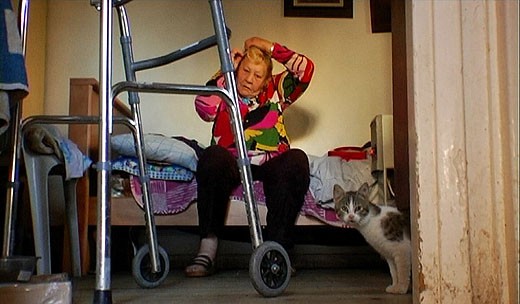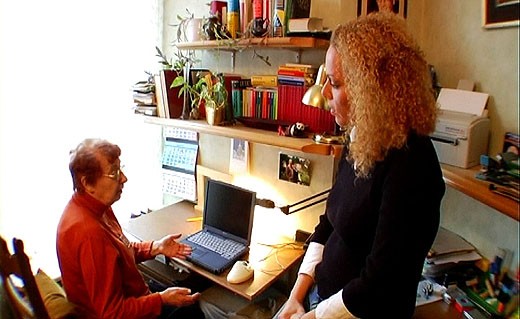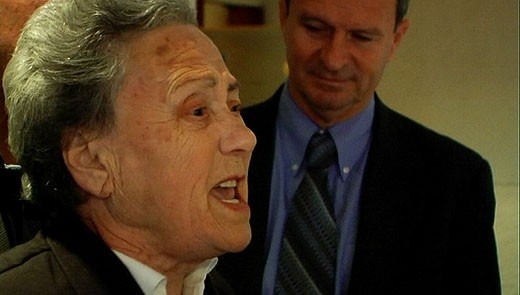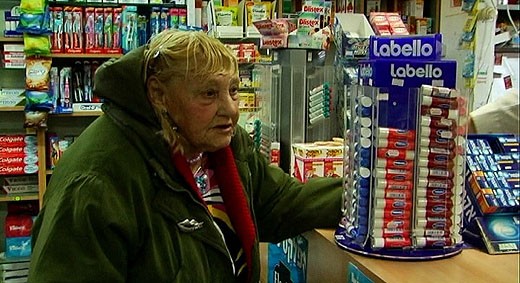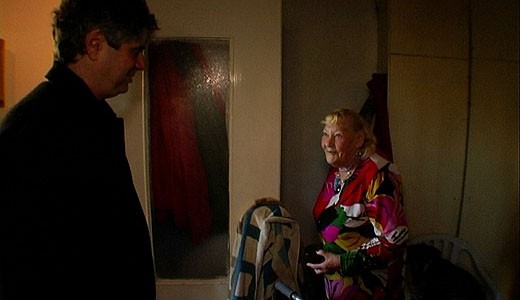Shot in Germany, The Netherlands, USA and Israel, this documentary deals with the situation of the Holocaust survivors in Israel and around the world. The Filmmakers follow the billions of dollars transferred from the German governments and other European governments as compensation for those who managed to live through the Nazi Terror. Their journey begins with the payment agreement signed in 1953 and ends with the exposure of enormous monetary sources such as real estate and bank accounts of Jewish victims. All of those are accumulated at many Israeli companies, who drag their answers in order to avoid giving the property back to its rightful owners. When the Filmmakers began their Journey, 280,000 Holocaust survivors lived in Israel. Nowadays there are only 270,000, 25% of which suffer from poverty and distress. In an attempt to end their life with dignity, some of them migrate back to Germany, where they can receive financial support and formal recognition as Holocaust survivors. "Paying for justice", is not an ordinary film about the Holocaust – it is an active documentary asking you to spare a minute before the last of living witnesses disappears; asking you to scream for justice.
Synopsis
Shot in Germany, The Netherlands, USA and Israel, this documentary deals with the situation of the Holocaust survivors in Israel and around the world. The Filmmakers follow the billions of dollars transferred from the German governments and other European governments as compensation for those who managed to live through the Nazi Terror. Their journey begins with the payment agreement signed in 1953 and ends with the exposure of enormous monetary sources such as real estate and bank accounts of Jewish victims. All of those are accumulated at many Israeli companies, who drag their answers in order to avoid giving the property back to its rightful...
Festivals
- Tucson Jewish Film Festival, USA, 2009
- Prix CMCA Int'l Film Festival, Italy, 2008
- CrossRoads Film Festival, Lublin, Poland, 2008
- Toronto Jewish Film Festival, Canada, 2008
Press & Links:
Press & QuotesIsraeli cinema, particularly its documentaries, never shies away from criticizing its institutions or its people. The Rabbinate, the Israeli Defense Forces, the health system, have all been scrutinized, evaluated, and found wanting. But rarely has a documentary been as intense and passionate about its subject matter as Paying for Justice. The filmmakers, Guy Meroz and Orly Vilnai, make no pretense of some artificial objectivity.
Their film begins after they have done their research, or as they say, are here to present their “statistike,” objective statistics. There are 80,000 Holocaust survivors living in Israel who live below the poverty level. There exist hundreds of millions of dollars and valuable land and artifacts that rightfully belong to the heirs of those who perished in the Holocaust, but these monies are unavailable due to an implicit conspiracy among banks, government agencies, bureaucrats, and the International Claims Commission.
And in the time it takes to view their film, two more Survivors die, denied the dignified life to which they are entitled. The filmmakers travel to Europe and the United States in an attempt to confront the responsible officials. In the process, we learn that many survivors have left Israel and returned to Germany
where their medical care is free and their monthly compensation as Holocaust victims is ten times what they were receiving in Israel. We learn that stolen artwork and other recovered articles are catalogued in Holland and in the process of being returned to the heirs, but in Israel, the land of return, there is no list and no return. Only due bills and overdrawn bank account notices find the survivors in a timely fashion. Shot against soaring buildings in bright sunshine and to the ironic sound of cheerful tunes glorifying the country, the filmmakers become their own subjects as they advocate the cause of the neglected survivors. They are shunned by underlings and their ministers on two continents. They barge into a breakfast meeting of the International Claims Commission which is sitting on anywhere from 350 million to a billion dollars earmarked for survivors to no avail. The head of the organization, Mr. Taylor, does not respond and the other participants look bored, sip from their water glass, or leave the room.
To those who find the survivors’ focus on compensation somewhat unseemly, I offer family testimony: my in-laws settled in Israel after the War, but their German “wiedergutmachund” was accepted on their behalf by a grateful Israeli government and presumably used for the general good and welfare.
My own parents, living in Communist Hungary, received no reparations. After coming to the United States, they were told they were ineligible. My mother nevertheless filled out forms and gathered evidence doggedly, until a second round of claims was authorized, and so, in her seventies, she began to receive approximately $300 every three months, in full and complete recompense for the loss of their infant daughter, father, mother in law, household goods, freedom, and a year’s slave labor.
My father, in a forced labor brigade from 1942-45, received nothing. My mother collected the funds and refused to use it.
With the help of their passionate and articulate advocates in Paying for Justice, a one time payment of about $300 per person was wrested from the bottled up funds, some but by no means all of the payments finding its way to the deserving survivors.
This documentary will politely and quietly outrage you with its presentation of injustice.Prof. Tom Friedman, Syracuse University, 2008
Paying for Justice ***1/2 (out of ****)
"Israeli filmmakers Guy Meroz and Orli Vilnai explore troubling issues of corporate corruption and dubious morality in Paying for Justice, a deeply disturbing documentary about denying compensation to Holocaust victims. Beginning in 1953, the German government began making reparations to Holocaust survivors. In Israel today, however, at least 25% of the nation's 280,000 Holocaust survivors are living in poverty, with many receiving little, if any, of their promised restitution.
Meroz and Vilnai vigorously challenge both the Israeli government and commercial banks on the question of what happened to the money, but as the film progresses, it seems clear that both politicians and financiers are willfully conspiring to keep as much of the gains accrued from the billions paid in reparations as possible. The film also looks at Israelis who regretfully abandon their homes and return to live in Germany in order to receive their full compensation.
Paying for Justice is a heartbreaking and gut-wrenching film to watch, as viewers witness elderly men and women suffering a new cycle of torment and anguish that began six decades ago. Highly recommended." ,
The Video Librarian, March, 2008
“The Lonely Jew" (about PAYING FOR JUSTICE)On the upcoming Holocaust Remembrance Day, it's more urgent to watch the film "Paying For Justice" than to stand in silence when the siren wails.
Yes, I'm working with Guy Maroz ( Israeli investigative journalist ) on a television show, and so it's not really acceptable for me to be writing about him here. On the other hand, there are things even less acceptable. For example, to let Holocaust Survivors still living among us exist in a state of abject poverty, in freezing conditions, starving, and without medicines: To essentially cause them an additional holocaust, yet this time, under the full auspices of a state- which has taken upon itself all their rights, to the point that it's own right to existence is hinged upon them. And indeed, the State of Israel arose and exists. Now the State is waiting for those same Holocaust Survivors to die. And the State is patient. For the State will be saved from having to pay the monies owed to the Survivors.
Meantime this waiting period isn't working badly at all. Some 80,000 Holocaust Survivors are living in poverty today, 30-35 of them die every day, because the State allocates them 330 NIS each month and withholds their assets. In Germany, for the sake of comparison, Holocaust Survivors receive approximately 4,500 NIS from the State, as well as free housing and medical. This is the reason that Israel is the only state in the world where Holocaust Survivors are still starving to the same levels as in the concentration camps. "At my age, the hunger is nothing. I'm used to it", says one woman interviewed in the film "Paying For Justice" (Dir. Guy Maroz and Orly Vilnai). You will believe her.
"Paying For Justice", which will be screened on Sunday on YesDoco (21.00) and on Channel 2 (23.15) is the most important documentary film you will see this year. As far as I'm concerned, all the planned special broadcasts for upcoming Holocaust Remembrance Day should be done away with and instead replaced by screenings of this film on a neverending loop, on all channels, until someone gets up and gives those Holocaust Survivors living among us the life they deserve according to the law, as well as putting an end to this situation which is beyond shameful: Rather, it is an outright humiliation- for me, for you, and for every person who calls themselves an Israeli. If the Holocaust proved that human evil knows no bounds, the State of Israel has now shown that there is still room for pushing those boundaries.
"Paying For Justice" exposes the Draconian system which prevents Holocaust Survivors from reaching their assets and finances, and subjects them to ongoing starvation, suffering and humiliation. Those people whose levels of despicableness and ugliness have so escalated to the point that they will deny survivors who can't even find coins for the bus from accessing their assets are sitting in a number of places, including: Some of the banks of Israel (Bank Leumi, for example, routinely prevents survivors from accessing the millions owed to them, yet will still place all manner of bothersome bank charges and duties upon them); The International Claims Commission, which in theory is supposed to concern themselves with survivor welfare, yet in practice is concerned with the earnings of the director and board; and the Chief Executor, who seemingly is unmoved by this matter. Maroz and Vilnai dutifully follow up on these addresses, yet witness a series of evasions and responses of which only the very hard the heart could be capable.This film doesn't save you from the conversations with the poor, lonely survivors either. They will break your hearts, if you still have one left to break. It is an effective film- one which has to do almost nothing in order to achieve this aside from to bring this outrageous story which is taking place under our stuffed noses. This Sunday- Holocaust Remembrance Eve- it is more important that you see "Paying For Justice" than stand in silence when the siren wails. The Past has past, and will never be forgotten, but the present- the only time over which we can have any sort of influence- cannot be allowed to pass in indifference.
Raa'nan Shakked, Yedioth Aharonot Weekend Magazine, April 13 th , 2007"Whoever watches "Paying for Justice ", will get their most painful and significant dose of Holocaust for this year. This documentary causes a different shock than the one we are accustomed to in this context. Holocaust survivors are dying here, inIsrael, suffering from humiliating conditions and poverty. They survived the Holocaust, but the daily life in Israel is a different story. Some of the survivors return to live in Germany, because the German government compensates them with a 15 times higher amount than they are "entitled" to receive in Israel, and pays for housing and medicine. The repulsive part of the picture: the money was transferred to the right authorities in Israel and abroad, but somehow, it is still held by these deceiving organizations. Bureaucracy, foot-dragging, covetousness, imperviousness, sickening indifference. Vilnai and Meroz found the precise combination of the victims' "misery-report", and a "Michael Moore" Style inquiry, searching for the money. They found it in the ministry offices, in the banks, in various committees – everywhere, except in the hands of the victims, who's life is gradually fading away. If I were a Holocaust survivor, I would return to the country that tried to kill me in the past. In some sense, it's better than living in a country which is trying to kill me now."
Leisure, May, 2007"I think it's the first time in the history of the "TV Holocaust Memorial Days" in which you could watch a protest film in prime time, instead of another melancholy memorial performance or a television product combining Auschwitz with the IDF. I don't know if the film will arouse public effect that would assist Holocaust survivors. It surely undermines the official image ofIsrael as a country whose gratefulness to the survivors is beyond words."
Ariana Melamed, Y-net, May 2007
"The POLIZER goes to Orli Vilnai-Federbush and Guy Meroz, to Michal Hochberg's research, and Inbal Petel's script. In fact it goes to whoever was involved in any way with the production of "Paying for Justice " – 55 minutes of thunder-striking documentation, of the most significant seen on our screens, which finally break the wall of official ceremony around the Holocaust Remembrance Day. The ritual of melancholy is now replaced by rage. Not towards the Germans who murdered my grandfather's family, but towards ourselves. This is the power of Docu-Activism. Yesterday, "Paying for Justice " managed to change the automatic agenda around the Holocaust Remembrance Day, when next to the victims of the Nazis, we were suddenly reminded of the victims of Israeli bureaucracy. All of a sudden, the Israeli Minister of Welfare Affairs remembered to call an emergency meeting. Suddenly we remembered the 80 thousand Holocaust survivors, who live in Israel in shaming poverty; commit themselves in a mental hospital just to earn a warm bed and human treatment, needing medicine that they cannot afford to buy, and hungering for bread. " For me hunger is nothing", says the survivor Elizabeth Dragotzky, who's story was published in "Yediot Achronot" yesterday, in a strong heart-breaking moment in the film. "I'm used to it. I was hungry all the time in the woods".
Meroz and Vilnai-Federbush traveled between Israel, New York, Berlin and Amsterdam, trying to figure out how this can be happening. How comes Holocaust survivors leave Israel and return, disgraced, to Germany, just to survive? How comes the Claim Conference, one of the institutes in charge of distributing the "Payment Agreement" money to the victims of the Nazi terror, has millions of dollars in its possession, when the victims themselves are dying insulted and empty handed? How can it be that the big banks in Israel are struggling so they won't have to give back the money and abandoned property of the victims? What's going on with us? Is this what we founded this state for ? Let's say that all of us have something to think about when we hear the siren today... As far as I'm concerned, "Paying for Justice " should be broadcasted each and every evening, at least until the next Holocaust Remembrance Day, at least until we obliterate the stain on the memory of the Holocaust, caused by this national disgrace. Guy Meroz and Orli Vilnai-Federbush raised this subject on to the collective agenda, and it shouldn't get off.. Otherwise we'll find ourselves crying, and not for the six millions; for ourselves."
Yaron Ten Brick/"Yediot Ahronot", May, 2007Festivals
- Tucson Jewish Film Festival, USA, 2009
- Prix CMCA Int'l Film Festival, Italy, 2008
- CrossRoads Film Festival, Lublin, Poland, 2008
- Toronto Jewish Film Festival, Canada, 2008
- San Diego JFF, USA, 2008
Educational
- Yad VaShem Visual Center
- NYU
- US Holocaust Memorial Museum
- Duke University
- Makor Jewish Library, Australia
- Maryland University
- Library of Congress
- Yale University
- Carnegie Library of Pittsburgh, USA
- University of Washington, USA
- Harvard University, USA
- Maryland University , USA
- Florida Atlantic University , USA
- The Open University, Israel
